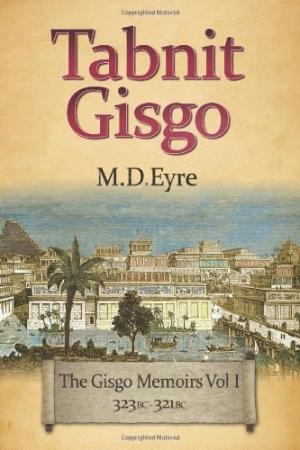Tabnit Gisgo
The Gisgo Memoirs Volume 1: 323 BC-321 BC
What George MacDonald Fraser and his Flashman character did for Victoria’s England, M. D. Eyre and his similarly cowardly, selfish, oversexed rogue, Tabnit Gisgo, does for Alexander the Great’s world empire. Written with tongue planted firmly in cheek, this first in what the author promises will be a long series of memoirs by his octogenarian informer/spy/assassin/soldier/unrepentant rapscallion is an absolute delight.
Eyre is more than a humorist or an adventure storyteller. He knows his history because he lives and teaches in the area where much of the action of his novel is set. Historical purists and devoted fans of Alexander the Great and his generals may cringe at Eyre’s scathing descriptions of the world conqueror as “Alexander the Unhinged.” They may groan at some of the puns and pinpricks Eyre tosses around about “fratricide being Macedonian royalty’s strong suit” and of how the revered historian Herodotus was “nothing but a disgraceful gossip,” but it is all in good fun—and possibly not far off the mark.
The debunking of legendary figures of history dates back as far as Aristophanes, who set quill to papyrus a century and a half before the title character of Eyre’s Tabnit Gisgo was born. As that Greek who is celebrated as the “Father” (or the “Prince”) of Comedy knew twenty-five centuries ago, poking fun at great people is hard work; the writer has to know his subject, perhaps even better than a biographer or historian. He also has to know his audience and how much satire they can digest without becoming weary of the humor the writer is serving up. Eyre comes dangerously close to filling that bowl of satirical stew to overflowing, but he repeatedly manages to catch himself just words before going over the top.
“Our ancestors,who, least it be forgot, were a worry to sheep in times gone by,” is one such quip that some readers may feel flows over the brim, as does Tabnit Gisgo’s musing of how “I yearned like a eunuch for his lost bits.” Eyre’s humor is very British, much like George MacDonald Fraser’s or even the writers of Monty Python, but it also contains a solid kernel of truth. Alexander, after all, was, as Gisgo “writes” in this supposed memoir, “an absolute despot” and “a man of ruthless resource who [knew] nothing but triumph and adulation and who, with the wave of a hand, [summoned] enough henchmen, assassins and executioners to depopulate half Asia in various imaginative ways.”
Gisgo, like Fraser’s Flashman of the nineteenth century, is an everyman, one with an innate sense of which facts are truth and which are pure puffery, and a determination for self-preservation. More concerned with where his next meal will come from and who will warm his bed than what primped-up peacock will next sit on a gilded throne, Gisgo is a character with whom many readers can identify. Indeed, he is a scoundrel of the first order, a reprobate of great renown, and more a coward than a hero, but Gisgo is most importantly a survivor. In times of war and upheaval, when tyrants run amok and “great” men turn prosperous cities into barren deserts, survival is both a skill and a necessity, and one worth emulating.
M. D. Eyre has given a world of readers a hilarious yet also very relatable character whose antics and tricks may help them as they, like Gisgo, struggle to survive in uncertain times.
Reviewed by
Mark McLaughlin
Disclosure: This article is not an endorsement, but a review. The publisher of this book provided free copies of the book and paid a small fee to have their book reviewed by a professional reviewer. Foreword Reviews and Clarion Reviews make no guarantee that the publisher will receive a positive review. Foreword Magazine, Inc. is disclosing this in accordance with the Federal Trade Commission’s 16 CFR, Part 255.

